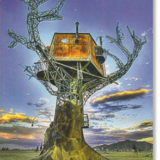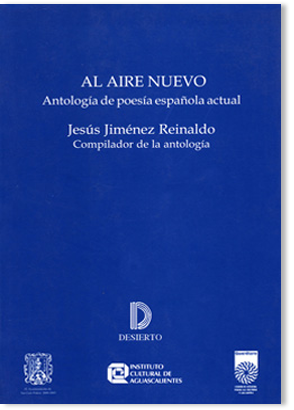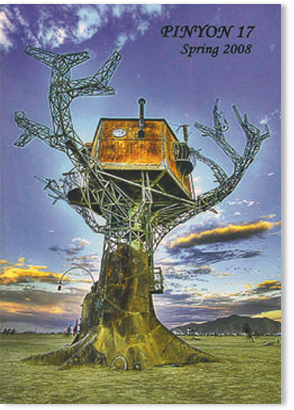
Portland Review
Elisa, la tejedora
Elisa, the Weaver. She had a limp, not an abrupt one, just a soft brush of her left foot over the floor. When I returned from school I could tell she had come home because the staircase smelled like her. It was a primitive smell— dirt, animals’ fur, smoke. It was the smell of her clothes. She was a fragile, old woman hidden inside layers of skirts and wool-woven shawls. She hand-made all her clothes. She was the weaver, Elisa la Tejedora, Elisa the Weaver.
Elisa came to my house some winter days to make twine for my father. She brought a basket full of dry hemp fibers, removed the wall calendar in the kitchen and hung the bunch of fibers on the naked nail. It looked like the mane of a decapitated woman.
She sat on a stool under the fibers, next to the wood stove, and grabbed the back of a small chair with her feet. Elisa took a handful of fibers and tied them to the chair with a little knot. She combed them with her fingers, put them in her mouth and wet them well with saliva. Then, she turned and twisted the fibers with her fingertips and kept adding pinches of hemp. That’s the way she made the twine. Her hands traveled from the mouth to the hemp, from the hemp to the mouth. The twine came out of her fingers—thin, wet and shiny. Elisa, the arms of a praying mantis, the mouth of a silk worm.
She worked in silence, sometimes she was stopped by a short cough. She drank a sip of water and kept working. Tejedora, le voy a dar unas manzanas para que se lleve a casa. Tejedora, let me give you some apples to take home. My mother said. No, que bastante me ha dado esta familia a mí. No, this family has already given me enough. She responded.
I knew the story, my mother had told me many times. When she was a young girl Elisa was picking up hemp out in the fields. She fell and rolled down the hillside. She broke her hip. My grandfather found her and brought her back to the town on top of his mule tied with a rope. Her bones never recovered and she never married.
When she was finished, she rolled the twine in a perfect hank and left it on top of the kitchen table. My father will use it to tie up lettuce, celery and artichoke bushes to protect them from the cold. Hay que atarlas. You have to tie them. My father said. They needed to be tied so the leaves didn’t spread open and the core of the plant didn’t freeze. It was fine if the outside leaves froze and got dark. Pero nadie quiere la verdura si está negra por dentro. Nobody wants the vegetables if they are black inside. My father explained.
Llévese las manzanas, que sé que le gustan. Take this apples, I know you like them. My mother insisted. But Elisa grabbed her empty basket, kissed me goodbye and left. Sometimes we heard the echo of her coughing along the staircase.
No te vayas, Tejedora. Don’t go yet. I wanted to say. Átame los ojos porque siempre miro lo que no debo mirar. Tie my eyes because I always look at what I am not suppose to. Átame las manos. Tie my hands. Tie my hands when the summer comes and my father sleeps in his bedroom in the middle of the day. The air is dense and hot and I want to lift the sheets and touch his legs. The bare skin between his legs that I imagine soft like buttermilk. Tie me, Tejedora, nobody wants a plant that turns black inside. Tie me, Tejedora, tie me with your rope made of time and saliva.





